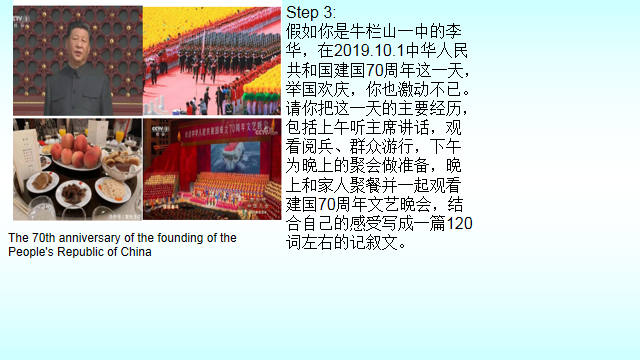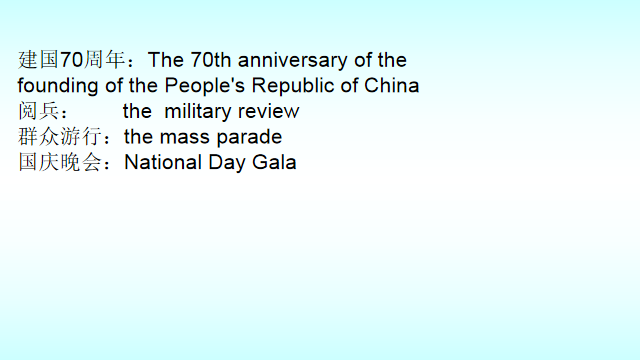教师活动
| 学生活动
|
环节一:课文阅读,获取信息(学习理解类活动)(7mins)
|
| Read and answer:
- What did the family do to prepare for it?
- What gift did the writer make?
- How did Grandpa feel and what did he say?
|
活动意图说明:
本节课的写作任务是写出一篇结构清晰、连接恰当的关于庆祝活动的记叙文。所以,在写前的阅读任务中,首先安排引导学生了解文章的写作目的及大意的任务。
引导学生分别从篇章结构、语言特征和逻辑关系几个方面多维度阅读,为课上深入学习做好准备。
学生根据自身学习水平自主学习,能够更充分地理解语言知识、得出语篇结构、对比语言特点、理解逻辑关系等。通过充分的课前准备,学生也能够在课堂上更加关注写作过程和效果。
|
环节二:归纳结构和语言,制定写作标准(学习理解类活动)(30 mins)
|
Step (1) 教师引导学生归纳篇章结构和关键信息(10mins)
教师指导
指导学生做笔记,为学生做写作内容方面的准备
Step (2) 教师引导学生关注语言和连接词的使用(10mins)
教师指导
Remind Students to underline the words used to link sentences and paragraphs by referring to the sentence builder Encourage students to create their own sentences for their writing.
Step (3) 教师引导学生两人一组互助完成各自的记叙文的提纲。(10mins)
教师指导
教师提供“导引框架表”,引导学生完成自己的作文提纲。
| Step (1) Read the description again to complete the structure and important details.
Introduction to the event{
Preparations before the event{
The best part of the event{
Feelings about the event{
Step (2)
Read the description again and summarize the adverbs of time and manner.
Focus on language:
Retelling the event with the key sentence patterns.
Introduction:That day was awesome. It was....
Preparation:Early in the morning,...First... Then... After a quick breakfast...
Best part: Just before...Surprisingly...As soon as...The best part came when... There was a lot of laughter...and quite a few tears...
Feelings: Towards the end of the the party, Grandpa said excitedly...
Step (3) Pair work: Ask each other questions:
- Why do you want to describe the event?
- What is the place, time occasion and people of the event? the layout of a formal description.
- What details do you want to include?
- What is your feeling at the end of the event?
|
活动意图说明
合作探究,互相启迪完成作文提纲,为写作做准备
教师在课上进一步引导学生深入探究文本,建构知识结构,为下一环节的写作活动做框架上、语言上的准备。在此基础上,学生利用“导引框架表”,通过同伴间分享交流的合作学习,激活学生已有语言知识,开阔思路,扩展语言储备,为后面自己的记叙文写作任务做好更充分的准备。
|
环节三:明确标准,让学生体验写作的真实过程(应用实践类活动)(30 mins)
|
Step (1) 教师引导学生归纳记叙文的评价标准
教师指导
通过举例,引导学生从语篇内容、语篇结构和语言特点三个方面制定写作记叙文的评价标准。
Step (2) 教师布置写作任务,学生描写自己在国庆70周年之际的庆祝活动。


| Step (1) Group work: Talk about how to write an event description. Make an evaluation criteria of writing a description.
e.g. List some questions for evaluation:
- Does the writer show the main idea of the passage?
- Does the writer include the time, place of the event?
- Does the writer describe details of the event?
- Does the writer describe his/her feelings?
- Does the writer use linkers to connect the series of activities?
Step (2) Writing: The Celebration of My Motherland’s 70th Birthday
|
活动意图说明
充分明确写作内容和要求,为学生自查和互评做铺垫
充分理解写作内容和要求,明确写作注意事项,有利于学生在写作过程中以及反馈过程中进行自我检查和互相评价。在教师的引导下,学生深层理解记叙文的语篇结构和语言特点,关注关联词对文本逻辑的推动作用。在此基础上,学生通过小组合作和老师启发制定出记叙文的写作评价标准,在写作前形成了明晰的写作目标,同时也为写作中完善自己的知识结构、以及写作后同伴互相反馈提供了依据。
基于单元内容的学习,学生对节假日及庆祝活动有一定的知识储备和语言储备。通过语言输出,学生回顾单元学习内容,进一步引发对主题的思考,培养文化意识,增强民族自豪感。
|
环节四:互评、自检、提升(迁移创新类活动)(10 mins)
|
Step (1) 教师引导学生根据写作评价标准进行同伴互评(点评作品、提出改进意见)
任务布置
学生完成写作(A)后,根据小组制定的记叙文评价标准,在组内展开互评(C、D)
Step (2) 教师引导学生反思同伴反馈,在此基础上自我检查并修改
任务布置
结合同伴反馈(C、D),自我反思与检查,修改或完善写作(B)
Step (3) 教师点评
| Step (1) Read the descriptions of your partners (at least two), giving the feedback according to the evaluation of an event description. If possible, give them some practical ideas to polish their letters.
- Mark any spelling, punctuation or grammars errors.
- Mark any unclear expressions. Give suggestions if you can.
- Underline the expressions you like.
Your comments:
Step (2) Polish your writing with the help of feedback from your partners.
My writing
| My polishing
| A
----------------------------------------------------------------------------------------
| B
----------------------------------------------
| Feedback from
| Feedback from
| Feedback from
| C
| D
| |
Step (3) Comments.
|
活动意图说明
关注写作反馈,多方参与反馈促进写作,以学生为中心
反馈有助于学生完善自己的知识架构、改进写作,它贯穿于学生写作的整个过程,有效地落实反馈有助于促进学生关注写作过程、反思自身问题,进一步提高语言表达能力。根据写作前小组合作得出的记叙文评价标准,在写作后的反馈环节中,学生针对同伴作品进行有依据、有条理、有内容的评析,同时也有利于学生进行自我反思及修正。
多方参与的反馈能更好地促进学生写作。在同伴互相反馈的环节,学生可以认识到自己与同伴的差距、多角度检视自己的作品;在最后的教师反馈环节,学生可以学习更多的改进策略,明确写作学习方向。
在写前、写中、写后三个环节中,学生直接参与知识发现的过程,用自己的已有经验来构建新的学习。通过有目的、有根据的反馈过程,学生分析、质疑、判断与评价,从而再次构建新旧知识的联系。而教师是学习资源的提供者、学习活动的组织者,教师的角色更多地是一个促进者而不是教授者。通过以学生为中心的学习活动,有效促进了学生思维品质以及学习能力发展。
|
![]() 川公网安备51152402000101号 )|网站地图
川公网安备51152402000101号 )|网站地图